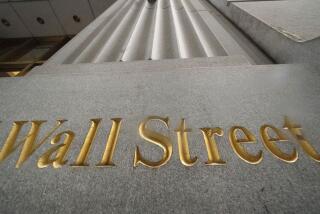Index Shuffle Sends Japan Stocks Down
- Share via
Japan’s leading stock index plunged Friday, but for once, domestic economic woes and worries about Wall Street were not to blame.
Instead, stocks tumbled 3.7% in Tokyo as traders altered their positions before a planned reshuffling of the stocks in the Nikkei stock average next week.
Many financial markets around the world were closed in observance of Good Friday. The currency markets provided the most intrigue, as the troubled euro hovered near its all-time low. The dollar rose against the Japanese yen but slipped briefly against the euro in quiet trading.
In Tokyo, the benchmark Nikkei index of 225 stocks fell 706.64 points to 18,252.68, wrapping up a week in which the index lost 2,181 points, or 11%.
The broader Tokyo stock price index of 1,400 stocks rose slightly Friday, confirming analysts’ belief that much of the selling of the Nikkei was technical. The TOPIX gained 0.3%.
Stocks initially rose in Tokyo as investors were cheered by a 169-point rise Thursday in the Dow Jones industrial average. But later in the session, investors began selling industrial stocks that will be removed from the Nikkei index starting Monday.
The Nihon Keizai newspaper, administrator of the Nikkei index, is dumping 30 stocks in favor of younger, technology-oriented companies to reflect changes in Japan’s economy. For example, housewares maker Noritake and mining company Mitsui Mining will be dropped from the index, while TDK Corp., a maker of magnetic parts used in disk drives, will be added.
The change mirrors the shift in the Dow Jones industrial average last fall, when Chevron, Goodyear, Sears Roebuck and Union Carbide were bounced from the index in favor of Intel, Microsoft, Home Depot and SBC Communications.
Changes to a prominent stock index can affect stocks’ performance in a number of ways. Investment funds that try to mimic the performance of the index generally sell the stocks that are being removed and buy the new stocks to keep their portfolios in line with the indexes.
Also, removal of stocks from the index tends to lower their prestige and makes them less attractive to investors.
Because the stocks being added to the Nikkei are generally more expensive than the stocks being dropped, traders said investors had to sell a broad range of shares to raise cash.
“People were selling not only the old components that will leave the index, they were also selling those that will stay in the index,” said Chuck Lambert, market analyst at Jardine Fleming Securities.
Other global stock indexes were mostly higher. Markets in Thailand, South Korea and Taiwan finished with modest gains in quiet trading.
In light currency trading, the euro drifted close to its all-time low but ended the day slightly higher against the dollar. In late trading in New York, the dollar bought 105.87 yen, up from 105.73 late Thursday.
More to Read
Inside the business of entertainment
The Wide Shot brings you news, analysis and insights on everything from streaming wars to production — and what it all means for the future.
You may occasionally receive promotional content from the Los Angeles Times.










